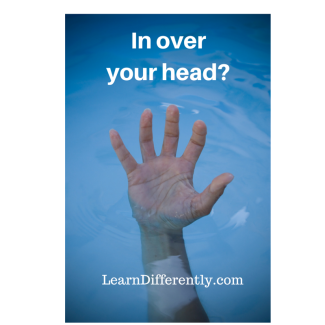In over your head?

Feeling that you’re nearly in over your head?
For most of us, the pace picks up in the fall. Classes, lessons, and therapies resume, and we get busier.
One afternoon in June, I was literally in over my head. Between homeschool conferences in Washington and California, friends took us to beautiful Lake Coeur d’Alene, Idaho, for an afternoon.

When my hostess invited me to go down and swim in the lake with her, I knew I should go enjoy it. I hadn’t been swimming in years and I’ll probably never be there again.
But that was also the problem—I hadn’t been swimming in years.
So when I realized the water was deep, I felt a bit anxious. I took precautions, went ahead, and had a great time.
Looking back, that delightful afternoon reminded me of four things:
- Don’t throw yourself in deeper than you need to. At the lake I stayed within 10 or 15 feet of the dock. I knew I could swim much farther than that, but I didn’t put myself near my limit.
Build some margin into your life. As mothers of kids with challenges, sometimes we take on more than we should. Saying “Yes, I can bring cookies to our next meeting/lead that committee/drive the kids to practice every week” is generous. But first saying, “Let me check my calendar and get back to you this weekend” may be wiser.
Now I realize when our kids have medical or other emergencies, we can be overextended, through no fault of our own. But generally, we need to watch ourselves and not take on too much. “Don’t play the martyr,” a college friend used to say. “There’s no future in it.” We parents can sometimes pile too much on ourselves.
- Find support. Because my swimming skills were rusty, I followed my friend’s lead and leaned on a foam noodle. With the noodle tucked under my arms, it was much easier to relax. In fact, we were in the water over an hour and had a good talk.
As parents of exceptional children, we need support, too. As other families go back to school, community pools and recreation departments are less busy and may be willing to run classes for homeschooled kids or other activities that could help your exceptional child. Therapists may be willing to organize social skills classes or other daytime group activities, while their public school clients are in school.
Or perhaps you want to follow the lead of one of parents I interviewed for Homeschooling Your Struggling Learner. She hired a student from our local university who was training to be a teacher. The student came over several times a week and helped her neurotypical kids while she worked one-on-one with her exceptional son. Then she and the student would switch.
The most obvious source of support is support groups. Don’t just mindlessly stay in your current situation if it’s not supporting you. Have you given up looking? See if new groups have formed, and reconsider groups you decided not to join before. Sometimes a group’s leadership, attitude, and direction can change.
(Learn more about finding support in these earlier blog posts here and here.)
- Make time to be with friends. I might have stayed in that deep water for 5 or 10 minutes if I had just had a lifeguard on duty. But having my hostess just a few feet away gave me comfort. While I thought we’d be swimming, instead we were just floating together, so I had the unexpected benefit of a long, pleasant, and useful conversation.
Taking time to phone a friend or arranging a trip to the playground together isn’t just a splurge. It’s part of your support system. Don’t wait for it to happen. Plan it. (And when life happens, reschedule it!)
- Enjoy what you can. Ask yourself these questions:
– Are my fears rational?
I was a little tense getting into deep water for the first time in years. But I knew I could swim, I knew I had the float and the dock nearby, and I knew I ought to enjoy that rare opportunity in such a lovely place.
Are you letting your fears run your life?
– Am I neglecting the good things? Floating there in the cool water, I could’ve worried about whether or not my legs were going to cramp, whether or not I was nuts to try this.
Intellectually, I knew I was okay. But I had to choose to enjoy what I had: a stunning view of the lake surrounded by forest and hills, the restful sensation of floating, the delightfully cool water, and a good conversation.
– Am I giving thanks? So often I am blessed, and so often I forget to give thanks. I spent years teaching my kids to say thank you. Will I?
Giving thanks refocuses my mind on my blessings and my Benefactor. It also puts my struggles and pains in perspective.
Enjoy your days. (And I hope this post makes you want to take an afternoon off and enjoy a cool, refreshing lake!)
In the comments below, please describe something that helps you regain a healthy perspective.



